#constitutional carry bill
Text
Going through the bills proposed in the kentucky 2024 legislative session and some of the things being proposed are
make a PFAS Working Group
require homeless shelters to provide free menstrual products (it's actually disturbing that they didn't already)
require schools to provide free menstrual products
create harm reduction centers and lower penalties for possessing controlled substances
require insurance to pay for cancer screenings (okay. low bar but okay)
abolish the death penalty (actually has a couple republican sponsors)
decriminalize cannabis
make fluoridation of water in districts optional (?????)
make coal the "state rock" of Kentucky
Prohibit children from being interrogated in a "deceptive manner" (?)
Make weight discrimination illegal
pay schools to food grown at kentucky farms to provide for school meals at low income schools (hey that's rad)
Lower the age of carrying a concealed deadly weapon from 21 to 18 (?????????????)
Require companies to give their employees earned paid sick leave
Impose restrictions on the collection of biometric data by private entities
Allow poultry to be sold at farmers' markets and at farms
pay for cancer screenings for firefighters
let pregnant incarcerated people have midwives or doula services
require that public high school curriculum include instruction on the history of racism
Remove Robert E. Lee Day, Confederate Memorial Day, and Jefferson Davis Day from the list of public holidays (WE HAVE THOSE?!!?!?!)
Retroactively expunge some cannabis convictions
"Prohibit public school districts from expanding any resources or funds on diversity, equity, inclusion, and belonging or political or social activism; prohibit public school districts from engaging in diversity, equity, inclusion, and belonging" (HUH?????)
require schools to give kids a lunch period of at least 30 minutes (the bar is in hell)
provide scholarships for teachers to help the teacher shortage and give teachers compensation for planning time
require schools to have defibrillators
make it so a homeless person doesn't have to pay to get a copy of their birth certificate
require a working smoke detector to be present in any house sold (...did we not already have this?)
create the Kentucky Urban Farming Youth Initiative
Require local governments to lower minimum square footage requirements for housing, and facilitate multifamily housing, manufactured housing, and "tiny homes," and require that zoning laws have a "substantial connection to protection of public safety, health, and usage of property" (This could be a good thing??)
require hiring and licensing authorities to allow people convicted of a crime an opportunity to get a job
Propose a new section of the Kentucky Constitution that guarantees the right of an individual to buy, sell, or use a certain amount of cannabis and to grow a small amount of cannabis plants, and put this on the ballot (LET'S FUCKING GOOOOOO LET THE PEOPLE DECIDE please this would be so funny)
Now let's watch how many of the good and basic common sense laws get left to die by Republicans because Republicans are ghouls
this is why it's important to vote in local elections, this is the kind of stuff that's being decided upon
989 notes
·
View notes
Photo
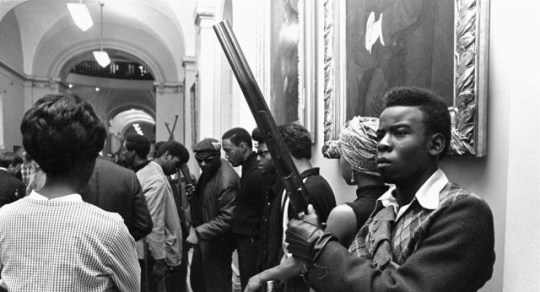
On this day, 2 May 1967, a group of Black Panthers armed with rifles and shotguns marched into the California State Capitol protesting against a gun control bill which was targeting them. To fight police violence and harassment against Black people, the Panthers used radios to listen to police calls, then members would attend scenes of arrest with law books and openly carrying shotguns – which was legal – and advise arrestees of their constitutional rights. To stop this self defence against the police, authorities brought in the Mulford Bill – dubbed the "Panther Bill" by the media – to ban the open carrying of loaded firearms in public. The National Rifle Association, supposedly a gun rights advocacy group, supported Republican governor Ronald Reagan in signing the legislation. To learn more about the Panthers, check out these books written by former members: https://shop.workingclasshistory.com/collections/books/black-panthers https://www.facebook.com/photo.php?fbid=618930186946867&set=a.602588028581083&type=3
1K notes
·
View notes
Quote
Trump’s loyal surrogates have duly embraced the project — perhaps no one more zealously than Ivan Raiklin, a retired Army Reserve lieutenant colonel and former U.S. Defense Intelligence Agency employee, who bills himself as the former and would-be president’s “future secretary of retribution.”
Raiklin is seeking to enlist so-called “constitutional” sheriffs in rural, conservative counties across the country to detain Trump’s political enemies. Or, as he says, carry out “live-streamed swatting raids” against individuals on his “Deep State target list.”
“This is a deadly serious report,” Rep. Jamie Raskin (D-MD) told Raw Story. “A retired U.S. military officer has drawn up a ‘Deep State target list’ of public officials he considers traitors, along with our family members and staff. His hit list is a vigilante death warrant for hundreds of Americans and a clear and present danger to the survival of American democracy and freedom."
Trump’s ‘secretary of retribution’ has a ‘target list’ of 350 people he wants arrested - Raw Story
121 notes
·
View notes
Text

The Hepburn Act killed regulated the railroad industry to death. Private railroads couldn't survive, and we're left with the government rails you see today.
Continued McKinley's Philippine-American War that exacerbated American imperialism and caused the deaths of 200,000 to 1 million Filipino civilians
Huge protectionist in a time where international trade was vital and expanding most rapidly
Loved unions and regulating industries
Pushed for income tax, laid the groundwork for Woodrow Wilson to establish income tax and federal reserve
Illegally gave congress the power to own the majority of the land in the west. Some might see this as a positive but I think private parks are generally superior to national parks.

I know Teddy is beloved by a lot of people, including conservatives. He's a manly man, loves nature, is charismatic. "Speak softly and carry a big stick." He finished his speech after being shot. I admire that.
But he was a socialist-lite, and the beginning of the modern "progressive" left. A habitual user of executive orders, Teddy felt congressional approval was merely a suggestion. He was only supportive of selective personal liberties - generally the things he and the progressives believed were the freedoms some individuals should be allowed to enjoy under their supervision as well as in context of a greater obligation to the nation as a whole. He believed in collective power over personal liberty and dressed it up in a quaint justification to deliver justice and equality to “the people.”
An excerpt on his legacy from the Miller Center of Public Affairs reads:
He made the President, rather than the political parties or Congress, the center of American politics. Roosevelt did this through the force of his personality and through aggressive executive action. He thought that the President had the right to use any and all powers unless they were specifically denied to him. He believed that as President, he had a unique relationship with and responsibility to the people, and therefore wanted to challenge prevailing notions of limited government and individualism; government, he maintained, should serve as an agent of reform for the people. His presidency endowed the progressive movement with credibility, lending the prestige of the White House to welfare legislation, government regulation, and the conservation movement.
"I find [Roosevelt] naively indifferent to the restraints of duty and even unaware of them; ready to kick the Constitution into the back yard whenever it gets in the way; and whenever he smells a vote, not only willing but eager to buy it, give extravagant rates for it and pay the bill not out of his own pocket or the party's, but out of the nation's, by cold pillage.
—Mark Twain, 16 February 1905
Thanks for the question! @hst3000. I should have dropped him to F tier actually, so i will. sorry lol.
See the rest of my Presidential Tier List:
32 notes
·
View notes
Text
.

Today, Jan. 30 California celebrates Fred Korematsu Day of Civil Liberties and the Constitution. Where does Fred Korematsu come in? Mr. Korematsu was an American civil rights activist who stood up to the U.S. government’s wrongful incarceration of over 120,000 people of Japanese ancestry living on the West Coast during World War II. Even without support from his family or community, he disobeyed the government’s orders, and as a result, spent over two years in various prisons and wartime incarceration sites. His case went to the Supreme Court, and in 1944, the Court ruled against him, claiming the mass incarceration was a “military necessity.” Nearly 40 years later, the government finally issued apologies and reparations to the camp survivors who remained, and in 1998 President Bill Clinton awarded Mr. Korematsu the Presidential Medal of Freedom, the highest civilian award in the United States.
In the same year (1998), California also launched the California Civil Liberties Public Education Program. The program, managed by the California State Library, funds projects that educate the public about civil liberties injustices carried out based on an individual or group’s race, national origin, immigration status, religion, gender, or sexual orientation (including, but not limited to, the internment of Japanese Americans during World War II). Over 400 projects have been funded since the program’s birth, including video and audio broadcasts, books, graphic novels, photo collections and exhibits, museum displays, arts performances, material preservation, educational guides, websites, public art and monuments, and more. To learn more about the program, visit library.ca.gov/grants/civil-liberties.
67 notes
·
View notes
Text
Let's talk about narrative formation for a sec:

I saw this thread going around as a counter-narrative "explainer" around the Supreme Court decision. First off Russell, "I don't have a tribe" is just such a line. I'm sus tbh? But the important thing is you found a way to feel superior to the other tribes, good for you. Still, if you deliver you deliver, what is the "just the facts" summary?
Right now the "headlines" around this case are essentially "the president granted immunity for official acts", which is a bad headline, because of course the president had immunity for some definition of official acts. You could never sue the president for the consequences of vetoing a congressional bill, or for the unintended civilian damages of a military operation, and this is true in most all countries. You might be saying "well sure obviously" but in law these things have a process - do you think laws around monetary damages liability have a clause at the end saying "oh except the President, this doesn't apply to him"? No, every law does not have that rejoinder - the way the president is immune to those laws is via having immunity above those laws, in the US via court precedent supposedly derived from the constitution - in other countries you might have an explicit bill about this, or an explicit constitutional clause.
Which is why OP can say things like this:
Executive immunity has always been a thing. The underlying rationale is that presidents cannot be encumbered in carrying out their necessary official duties with fear that they will be sued into oblivion for doing so...
...SCOTUS today laid out the tension: the president needs to be able to act within the scope of office without fear of politically-motivated prosecution after leaving office; but the president also cannot be "above the law."
And be correct; most headlines were setting up the idea presidential immunity as shocking, when in fact it is normal. He proceeds to explain that the court set up the terms of immunity, denying Trump X while affirming Y, and make it look very balanced, like they just defined the parameters of immunity a bit. So he can conclude with this:

And it can be a strong "calm down" note, which can even be true to an extant - but only because he is buying into the narrative social media set, and setting up his conclusion against that as the barometer.
In reality, everyone in the court knew that presidential immunity existed, that wasn't what the case was really about. It was always and forever about those parameters. And these are the parameters it set:
Taking into account these competing considerations, the Court concludes that the separation of powers principles explicated in the Court’s precedent necessitate at least a presumptive immunity from criminal prosecution for a President’s acts within the outer perimeter of his official responsibility.
Outer perimeter is defined in the document as essentially the maximum possible breadth of presidential power. There is nothing inherent about this - presidents could, for example, have immunity for every veto they issue, but still be liable to libel & incitement laws for speeches they give as president. This is explicitly rejected:
The indictment also contains various allegations regarding
Trump’s conduct in connection with the events of January 6 itself. The alleged conduct largely consists of Trump’s communications in the form of Tweets and a public address. The President possesses “extraordinary power to speak to his fellow citizens and on their behalf.” Trump v. Hawaii, 585 U. S. 667, 701. So most of a President’s public communications are likely to fall comfortably within the outer perimeter of his official responsibilities
You see how outer perimeter comes back into play - any and all acts that could possibly be considered official fall into this bucket.
So the only place immunity doesn't fall is when an act is "unofficial", aka not part of their role as president: Which is where you get to the evidentiary standards pieces, things like:
In dividing official from unofficial conduct, courts may not inquire
into the President’s motives. Such a “highly intrusive” inquiry would risk exposing even the most obvious instances of official conduct to judicial examination on the mere allegation of improper purpose.
Or the parts where they say evidence & testimony from "official acts" cannot be used as evidence in trial based on the context.
You saw a lot of headlines that were like "Trump has immunity for official acts, but not unofficial" acts, like that was ever in contention. Outside of the Trump campaign no one thought the President could wander drunkenly into a bar and murder someone and get away with it. The case was forever and always about where is the line for immunity, what counts as official, and how you determine it.
And at almost every possible avenue this decision pushed the line towards immunity, to expanding presidential authority. But it gets to appear balanced to our boy Russell when it does shit like this:
Finally, SCOTUS considers and rejects Trump's "far broader" argument for immunity. Trump's team argued that he can't be prosecuted for anything unless he is first impeached & removed for it. SCOTUS says there's no textual support for this argument.
See, they rejected ludicrously spurious claims that impeachment existing as an option made legal drunkenly murdering people in a bar. Compromise!
OP is a contrarian - they like to push against the mainstream. I get it, I have that instinct too. And he is smart, he noticed the radical redefinitions of evidentiary standards - but only in the replies:

But since the mainstream narrative around the case set up a sort of false dichotomy, of the case being about "immune or not", "official or unofficial", it makes the contrarian instinct push back on the idea that the case is a big deal. Trump isn't getting immunity for all his past actions! After all, he didn't have this ruling as a playbook and so fucked up by trying to do some of it in secret. So it's fine!! He gets to say this:

And be like "haha" because the narrative he is fighting against is that "official versus unofficial". It lets him ignore that Sotomayor understands that; what she is saying is that Presidents - who have killed American citizens before! - can probably just define actions as official under this doctrine if they do it right. Outer perimeter, baby. You cannot question their motives. Threat to national security, trust me bro.
(Do I think in practice the SC would actually ignore a murder? No - but they would waive immunity by contradicting their own case here. They would discard consistency for practicality. The real concerns are less fanciful, but still serious)
So this is an extremely long-winded way of saying that narrative formation does matter vis a vis truth. I can't blame the headlines too much or anything, this shit is very complex, but because they misrepresent the details of why the case is so worrying, it gives easy fuel for people to dig a little bit, feel superior to the headlines, and ignore them. And the majority opinion did a lot of work to brand it that way - casually dismissing, even mocking, the dissent opinions while misrepresenting their concerns. As a news org you shouldn't carry water for them like that. Don't let Russell get his "I have no tribe" points that easily - make him earn it.
(And, to cover my own base - the one big place the court wasn't maximalist was that they extended presumptive immunity, not full immunity, to the outer perimeter. Which is vague, that is not some precise term, but it does give them an out)
23 notes
·
View notes
Text
Safe Snorting Guide

Insufflation or snorting is a common means for administering drugs. However, snorting still comes with some risks that can be avoided with the proper precautions.
How Insufflation Works
When a drug is snorted up the nostril, it enters the bloodstream through blood vessels that line the nose. This means the effects of the drug will have an earlier onset than the oral route.
The Risks of Insufflation
While insufflation at first glance has less risks than other methods of consuming drugs, it still comes with its risks. If you are snorting drugs, please keep in mind that:
Snorting a drug can still result in overdose.
Regular snorting can damage your septum and cause a hole to form.
Using bills or keys can expose you to unnecessary germs
When snorting drugs, the skin in your nose can become damaged and lead to bleeding, when snorting equipment is shared, this can spread Hepatitis C.
Preparing Drugs for Snorting
Note: If you are snorting any drug that is a press, keep in mind that the pill weight will not be the same as the amount of drug in the pill. Get a good milligram scale to weigh your pill. Divide the weight of your press with the amount of drug in the press. That'll tell you how many milligrams of pill powder you'd have to snort to feel the affects of 1 gram of drugs.
Example, if you get a press that is 30mg of adderall, but the pill weighs 90mg, you'd have to snort 3mg of adderall to get the same effects of snorting 1mg of speed. If you plan on snorting 15mg of speed, you'd need to snort 45mg of adderall to get the same effects.
If you want to snort a drug that isn't already in its powder form, there are two main ways to crush drugs into a fine powder.
The first way can be done with a lighter and a bag/piece of paper. Place the drugs in your bag or in between a folded piece of paper. Hold your bag/paper on a solid surface and hit the drugs with your lighter until it is a fine powder.
The second method is to use a pill crusher to crush your drugs into a fine powder. It is recommended that you clean your pill crusher with an alcohol wipe and to let it dry in between use. Especially if you are using it to crush a different substance.
Testing Drugs
Now that your drugs are a fine powder, you can snort them. It is recommended to do any drug testing prior to snorting. Presses can often contain more substances than they are sold as. And the content of substances in your press can be lower or higher than what it's sold as.
Drug testing kits are available at:
qtests.org (dosage)
dancesafe.org (drug checking)
bunkpolice.com (drug checking + dosage)

Snorting
After your drugs are finely crushed, measure out the amount of drugs you plan to snort. Know what constitutes a light, common, and heavy dose for the substance you are going to use.
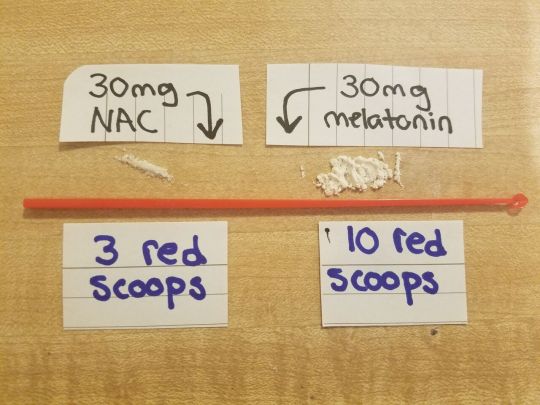
DO NOT EYEBALL. Eyeballing is not recommended as it is highly innacurate and unreliable. Eyeballing can put you at higher risk of overdose. Measure your drugs with a milligram scale.
When your drugs are measured, pour them onto a clean surface and use a piece of cardstock, hard plastic, or a clean razor to cut your drugs into lines. Don't use banknotes or keys for snorting. Use a plastic straw, paper straw, or a glass stem.
Exhale, put the straw or glass stem in your nose (make sure it goes in above your nose hairs), and then inhale the drugs through the straw. After all the drugs are snorted, exhale out the mouth, and then put a couple drops of sterile water up your nose.
To reduce risk or irritation, use a vitamin e oil or saline spray after snorting and switch between nostrils on a regular basis.
Naloxone
It is still possible to overdose while snorting. Because of this, it is very important to carry naloxone on you. Naloxone comes in both nasal spray and IM injections.
0.4mg/mL IM and 3mg or 4mg IN naloxone are the best doses. Higher doses such as 5mg IM or 8mg IN naloxone increases the risk of withdrawal symptoms and put the person in more harm.

If you need to access naloxone but don't know where to go, I highly recommend Next Distro. I got IM naloxone from there for free and the people from there are wonderful.
For more resources on safe snorting and reponsible drug use:
youtube
102 notes
·
View notes
Text
The Supreme Court is trying to drag America backwards to “Separate but Equal”

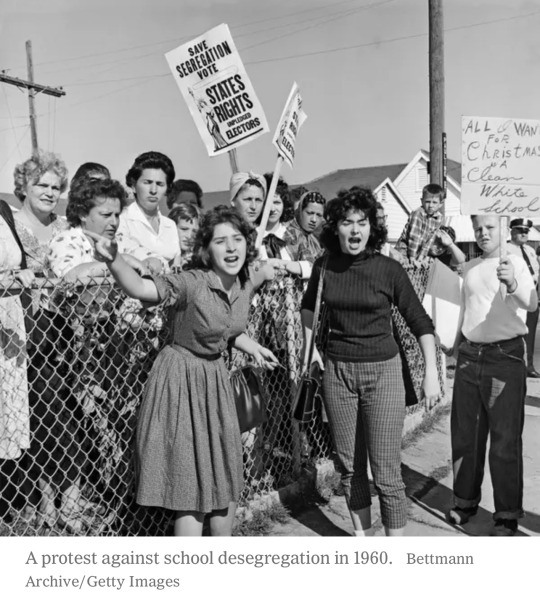
President Andrew Johnson vetoed the nation’s inaugural Civil Rights legislation because, in his view, it discriminated against white people and privileged Black people. The Civil Rights Act of 1866 (which Congress enacted over the veto) bestowed citizenship upon all persons — except for certain American Indians — born in the United States and endowed all persons with the same rights as white people in terms of issuing contracts, owning property, suing or being sued or serving as witnesses. This law was proposed because the Supreme Court had ruled in Dred Scott v. Sanford that African Americans, free or enslaved, were ineligible as a matter of race for federal citizenship, and because many states had barred African Americans from enjoying even the most rudimentary civil rights.
Johnson vetoed the act in part because the citizenship provision would immediately make citizens of native-born Black people while European-born immigrants had to wait several years to qualify for citizenship via naturalization (which was then open only to white people). According to Johnson, this amounted to “a discrimination against large numbers of intelligent, worthy and patriotic foreigners, and in favor of the Negro, to whom, after long years of bondage, the avenues to freedom and intelligence have just now been suddenly opened.” Johnson similarly opposed the provision in the act affording federal protection to civil rights, charging that it made possible “discriminating protection to colored persons.”
A key defect of the Civil Rights Act, according to Johnson, was that it established “for the security of the colored race safeguards which go infinitely beyond any that the general government has ever provided for the white race. In fact, the distinction of race and color is by the bill made to operate in favor of the colored and against the white race.” Johnson opposed as well the 14th Amendment, which decreed that states offer to all persons equal protection of the laws, a provision which he also saw as a wrongful venture in racial favoritism aimed at assisting the undeserving Negro.
In 1875, Congress enacted legislation that prohibited racial discrimination in the provision of public accommodations. Eight years later, in a judgment invalidating that provision, the Supreme Court disapprovingly lectured the Black plaintiffs, declaring that “when a man has emerged from slavery, and by the aid of beneficent legislation has shaken off the inseparable concomitants of that state, there must be some stage in the progress of his elevation when he takes the rank of a mere citizen and ceases to be the special favorite of the laws.”
In 1941, President Franklin D. Roosevelt promulgated Executive Order 8802, which prohibited racial discrimination in the employment of workers in defense industries and established the Fair Employment Practices Commission to carry out the order. Assailing the order, Representative Jamie Whitten, a Mississippi segregationist, complained that it would not so much prevent unfairness as “discriminate in favor of the Negro” — this at a time when anti-Black discrimination across the social landscape was blatant, rife and to a large extent, fully lawful.
Segregationist Southerners were not the only ones who railed against antidiscrimination laws on the grounds that they constituted illegitimate preferences for African Americans. In 1945, the New York City administrator Robert Moses inveighed against pioneering municipal antidiscrimination legislation in employment and college admissions. Displaying more anger at the distant prospect of racial quotas than the immediate reality of racial exclusions, Moses maintained that antidiscrimination measures would “mean the end of honest competition, and the death knell of selection and advancement on the basis of talent.”
Liberals, too, have attacked measures they deemed to constitute illicit racial preferencing on behalf of Black people. When the Congress of Racial Equality, or CORE, proposed “compensatory” hiring in the early 1960s — selection schemes that would give an edge to Black people on account of past victimization and the lingering disabilities caused by historical mistreatment — many liberals resisted. Asked about CORE’s demands, President John F. Kennedy remarked that he did not think that society “can undo the past” and that it was a mistake “to begin to assign quotas on the basis of religion, or race, or color, or nationality.”
Kennedy’s comment that it would be a mistake “to begin” to assign quotas reflects a recurring misimpression that racial politics “begins” when those who have been marginalized make demands for equitable treatment.
When Kennedy spoke, unwritten but effective quotas had long existed that enabled white men to monopolize huge portions of the most influential and coveted positions in society. Yet it was only when facing protests against monopolization that he was moved to deplore status-based quotas.
This same dynamic has been recurrent in subsequent decades: Every major policy seeking to advance the position of Black people has been opposed on the grounds that it was race conscious, racially discriminatory, racially preferential and thus socially toxic. That racial affirmative action in university admissions and elsewhere has survived for so long is remarkable, given the powerful forces arrayed against it.
(continue reading)
#politics#scotus#education#affirmative action#separate but equal#republicans#racism deniers#white supremacy#two americas#double standards#racism
140 notes
·
View notes
Note
unpopular opinion that each arc should have changed POV based on who it was centered around (aka escape arc was ray, goldy pond was emma, imperial was norman etc.) cuz it would have balanced out all of their development more than just focusing on emma
ty for carrying this fandom on ur back :D
If we're narrowing it down to a single person carrying the fandom, it's definitely @1000sunnygo for not only compiling the most comprehensive masterlist of materials for the English-speaking fandom, but also translating countless fanworks purely out of love for the series. The thought is very sweet, though! 💖💝
I don't entirely disagree with what I think is the underlying sentiment behind this ask of wanting more insight into the characters because switching the main POV for different arcs of a story can shake things up and be engaging, but assuming we're working under the same chapter/time constraints, I'm not sure what new development could be gained and balanced by this with how much POV swapping we already do between chapters and within single chapters? Other than potentially more insight into the specifics of Norman's time at Lambda and post-Lambda escape, including the Ayshe-Norman conflict branch that Shirai consciously cut to streamline the story.
Would swapping POVs mean we're firmly locked out of any other character's internal monologues? Or would we see monologues like Emma's feelings toward Isabella, Emma saying she wants to be like Norman and Ray, Norman saying he wants to be more like Emma, Norman's incensed vow that he won't lose to Isabella, and Emma's reflection on how Norman's apparent death hurt her retooled later on in their respective POV sections?
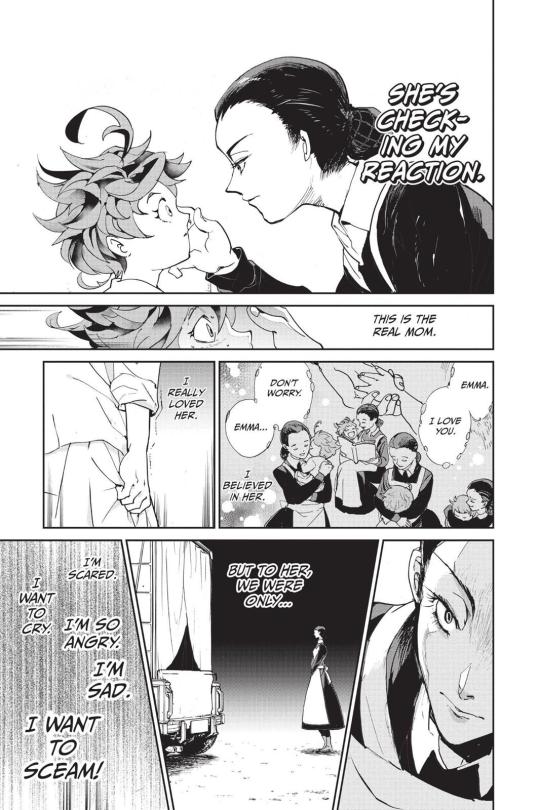



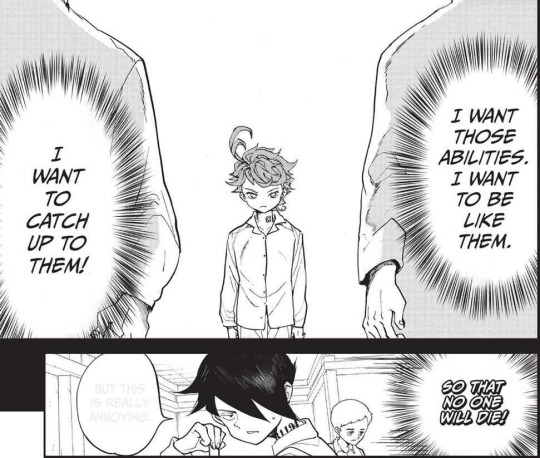


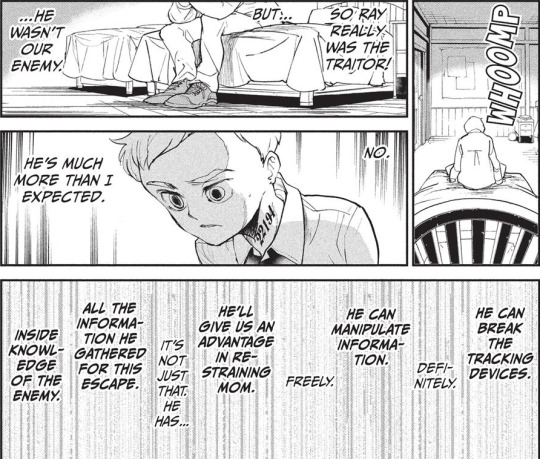

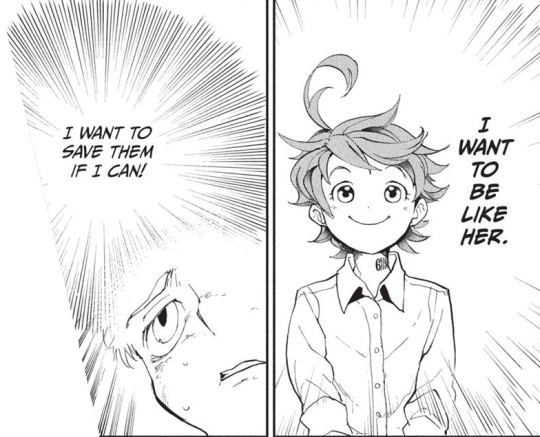
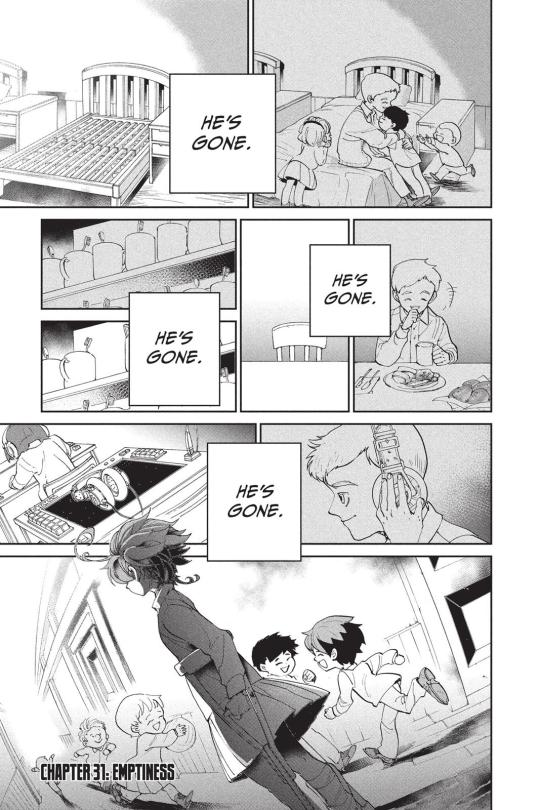

(Chapter 3 | Chapter 5 | Chapter 10 | Chapter 14 | Chapter 31)
Granted, the anime cut all of those too, but that's one of the main criticisms I've seen lobbied against it, even with how it reflects some of the essence of them in other ways. Still, I feel like the escape arc is balanced near perfectly in the amount of focus each member of the trio is given and at what point insight into each of their psyches is explored. That balance is what I would have liked to see replicated in subsequent arcs, specifically during the imperial capital battle arc.
A criticism I've seen toward this portion of the story, and one that I assume is one of the main inspirations for this ask, is how Ray comparatively fades into the background/feels like he's on unequal billing with Emma and Norman despite his prominence in the beginning. The series' Japanese logo even features three parallel lines that represent each member of the trio (minus chapters 30 and 31 when Norman's line was removed to fake out Japanese readers)



(Mystic Code Book Chapter 1 | TPNManga Tweet)
So for a lot of people to see him not be as engaged with his own agenda feels kind of jarring.
I don't mind him aligning with Emma's position at this point despite his personal reservations given the conclusion of the escape arc has his entire worldview being thoroughly reconstructed, but I would have liked more reflection and insight that we see crop up in the bonus pages since we have small moments like Emma taking some time to speculate if a person losing their memories constitutes death in the story proper.
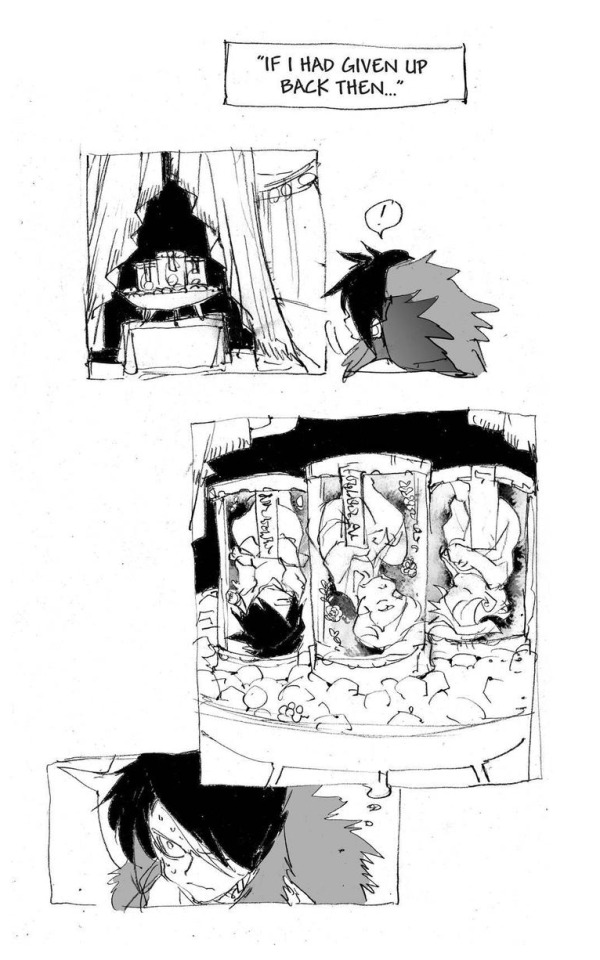

(Chapter 159 Bonus Scene | Chapter 169 Bonus Scene; I'm very happy both of these scenes are included at all, but they're unfortunately among the casualties of Shirai trimming branches that don't feel as integrated into the narrative in the last few arcs due to the accelerated pacing.)
I also feel the story would lose some cohesion by displacing Emma as the main character given she's the main driving force behind the idealism that permeates the series and thus serves as the strongest unifier to keep that theme front and center. Similarly, I'd hate to lose out on how beautifully foiled she and Isabella are during the escape arc and having such a powerful and heartbreaking mother-daughter dynamic as a focal point of a shounen jump series.

(Mystic Code Book Chapter 2)
That said, this is another topic where I'm at odds with Sugita as I would have very much been up for more time spent developing the secondary cast.
#FSS Asks#FSS Chatter#The Promised Neverland#Yakusoku no Neverland#TPN#Full Score Trio#TPN Emma#TPN Norman#TPN Ray#TPN Isabella#Escape Arc#Ray#Goldy Pond Battle Arc#Emma#King of Paradise Arc#Imperial Capital Battle Arc#Norman#Isabella#Mystic Code Book#Suguru Sugita#TPN 003#TPN 005#TPN 010#TPN 014#TPN 031#TPN 159#TPN 169#Introduction Arc#Return to Grace Field Arc
37 notes
·
View notes
Text
goo hara’s mother lost the inheritance lawsuit!!!!!
it’s been almost afer five years, but the constitutional court of south korea released a ruling against family members who did not fulfill their duties to the deceased as unjustified.
which means the mother will not receive any inheritance from the deceased singer's estate.
after hara’s demise, a petition was filed to amend the inheritance laws to prevent negligent parents and family members from claiming the inheritance. The bill carrying the amendments to the inheritance law was called the Goo Hara Act. which is still pending in the 21st national assembly.
now after the constitutional ruling, the public lies in awaiting whether the National Assembly will pass the Goo Hara Act.
#THANK GOD#this is the best news ever#may she fully rest in peace now 💐#i’m so so happy for the brother as well#such wonderful news!!!#update#hara#goo hara#kpop#kara#news
23 notes
·
View notes
Text
The Sign of Four: The Strange Story of Jonathan Small (Part Two of Two)
CW for graphic discussion of war crimes.
Sepoy was a term, derived from the Persian sepāhī meaning "infantry soldier", that was used to refer to Indian soldiers, generally with muskets, in the Mughal Empire's armed forces and also Maratha Army. Europeans then used the term to refer to Indians in their colonial forces. One of the names of the rebellion was the Sepoy Mutiny.
Today, Sepoy is the equivalent of "Private" in the Indian and Pakistani armies.
Cawnpore, now Kanpur, was the scene of a siege of East India Company forces and associated civilians in 1857. The EIC surrendered in return for safe passage offered by Nana Sahib, leader of the rebellion on the area. Then, for unclear reason, the departing men, women and children were attacked - no definitive evidence that Sahib authorised this has been found. All the men were killed, with the surviving women and children taken to a villa called Bibighar. 22 days later, although some sepoys refused the order, they were nearly all massacred, with their naked bodies thrown down a well. The British arrived the next day to recapture the city and then carried out horrific summary justice against any rebels who could not prove their innocence. Space precludes me from covering it in depth.
Historically, treason, like the rajah has basically done, would result in Parliament passing an act of attainder, basically seizing your entire personal property plust titles without any judicial process. Not sure what the East India Company's rules were on that. The US constitution specifically bans Congress and the states from passing any bills of attainder.
I'd need to enquire about this, but EIC sepoys apparently swore loyalty to the salt they had eaten, hence the term "true to their salt".
A postern is a side entrance in a city or castle wall, usually concealed so it can be used for stealthy entrances and exits; it could also be used during a siege for the defenders to make an attack on their besiegers. The foundations of one from the London Wall can be seen next to the Tower of London.
A firelock is a musket where the powder is ignited by sparks, either from a lit match or friction from a piece of flint.
The wet season in India lasts from around June to September, when 80% of the annual rainfall occurs. This is vital for Indian agriculture and delays in it occuring can cause real problems. In any event, you get near-daily thunderstorms and torrential downpours. This can result in roads getting badly damaged and flooding in places with poor drainage. Bollywood is a particular fan of romantic scenes involving monsoons, because they allow for sexy wet people.
I believe a mound-heap is another term for midden, an outside dump for all sorts of domestic waste, ranging from broken pottery to animal bones to human waste. Archaelogists are particular fans of them as they provide evidence of past human habitation of a sight. Poor people in Victorian London would search through them for any items of value.
The British last executed someone by firing squad in 1941 when Josef Jakobs, a German NCO convicted of spying was shot at the Tower of London. Two American soldiers would be shot at Shepton Mallet in 1944 for murdering fellow soldiers.
Before the introduction of compulsory recording of police interviews in 1992, records of interviews were generally made from notes taken during the interview or even the officers' memory, with associated problems. The interviewee would then be asked to sign the official record, something frequently refused, especially if it looked like they were signing a confession. It was also pretty common for police to engage in "verballing" i.e. falsifying the record to make it appear there had been a confession.
"The first water" means the diamonds were of the highest quality, basically having the appearence of clear water.
Commutations of death sentences were in fact quite common, especially for lower-level offences. If you see "death recorded" in a trial transcript, it means that the judge had to pass the death sentence, but clearly intended for there to be a pardon or commutation. This often occurred for sodomy convictions.
Mount Harriet is a 383-metre high hill today called Mount Manipur.
A military officer who went bankrupt, especially for gambling debts, was going to lose his commission at best. Bankruptcy is still going to be a real concern in any armed forces today, especially for your security clearance.
It is around 375 miles as the metaphorical crow flies (crows are not sea birds) to Myanmar, then Burma and a British colony. The only place you could reasonably reach from Port Blair that was not under some form of British control was Siam (now Thailand), which remained independent throughout the imperial era, except when Japan invaded it in 1941.
Yawl has several definitions, including a sail layout commonly used for racing yachts in this period.
The belief that the Andaman indigenous people were cannibals appears to have come from the account of Marco Polo.
Hundreds of people tried to escape from the Andaman penal colony, including 288 of the initial 1858 arrivals, a third of those who survived the original journey. However, the thick jungle and "the murderous attacks of the savage aborigines", as military doctor and original governor James Pattison Walker put, led to 81 survivors limping back to Port Blair. They asked for mercy and medicine. Walker had them and seven other recaptured prisoners all hanged the same day. Many who got off the island likely drowned.
Two prisoners in 1872 managed to get all the way to London, after convincing a British vessel they were shipwrecked fishermen. However, the manager of the Strangers Home for Asiatics in London where they ended up got suspicious, took photographs of them and sent them around the empire. That led to their recapture.
The calabash fruit, also known as the gourd, can be turned into bowls or other containers. Gourd is also a slang term for "mind".
The pilgrims sailing from Singapore to Jiddah (or more usually Jeddah) would likely have been heading for Mecca to take part in the hajj. This a pilgrimage considered one of the five pillars of Islam and mandatory at least once in a lifetime for any Muslim with the physical and financial ability to do it. Modern travel has made this a lot less hazardous - past pilgrims faced dangers including piracy, with even some of the Caribbean pirates sailing around Africa to attack ships for the treasures that might be going with them. At least until they reach Mecca, when everyone dresses in the same simple clothing.
At the time of this story, Jeddah, Mecca and Medina were in the Vilayet of the Hejaz, a province of the Ottoman Empire.
The 1445/2024 Hajj, ongoing as I post this, has attracted 1.833 million pilgrims. These numbers have caused stampedes and spread of disease; this year has also seen deaths due to heat stroke in 48 degrees Celsius temperatures. The Saudi authorities have taken various measures to improve safety, including registration requirements and improvements to the site layout provide escape routes.
From Jeddah (and other places in the region), pilgrims would historically travel to Mecca in large camel caravans with military escort as protection against bandit attacks. Today, Jeddah is home to the biggest airport in Saudi Arabia with a dedicated and distinctive terminal for the pilgrimage, as the vast majority of pilgrims arrive via air today. From there, modern roads and a new high-speed railway provide easy access to the holy sites.
Performing in "freak shows" was one of the few ways that severely disabled people could earn a living in these period - it was often that, begging or the workhouse; Joseph Merrick could not hold down any other employment because of his appearance. People with microcephaly i.e. a smaller than usual head were passed off as "missing links". However, by 1888, public opinion was turning against such acts.
#letters from watson#sherlock holmes#history#factoids#the sign of four#sign#east india company#india
16 notes
·
View notes
Text
... A RAND Corporation analysis found that available evidence supported the hypothesis that concealed-carry laws may increase total homicides, and found some, albeit limited, evidence for concealed carry laws increasing violent crime in general.
Likewise, researcher Stephen B. Billings found that gun ownership has a link to crime victimization: not only are people who have been victimized more likely to buy a gun to protect themselves, but they are more likely to be victimized again and have their gun stolen from them in turn. Billings found a vicious cycle of victimization leading to gun ownership, leading to theft, leading to victimization, as guns that are bought in response to victimization are then stolen, sold on the black market, and used to create new victims.
This is what makes it very odd that concealed carry is touted by conservatives as a mechanism for improving public safety. So-called “constitutional carry” is more likely to make Louisiana’s streets more dangerous, and to lead to the proliferation of firearms on the black market as gun theft becomes more commonplace.
**
Another argument for gun ownership comes from the far left as frequently as it does the far right, and has to do with gun ownership being a means for the preservation of liberty; that’s where the “constitutional” part of “constitutional carry” is supposed to lead you to in your head. Putting aside left-wing questions of revolutionary strategy, this law is also weaker constitutionally than its proponents let on. The second amendment does not specify concealed carry. It authorizes “the right to bear arms”, and to “bear arms” for the writers of the Constitution explicitly entailed visibly carrying a firearm in a public setting, or open carry. So-called “constitutional carry” also does nothing to restore the constitutional right to bear arms of individuals who have been felonized by the state; the abrogation of such right being one of the major contributors to mass incarceration, which, alongside mass surveillance, is possibly the greatest threat to liberty today. If the defense of liberty is what matters to someone in their defense of the right to bear arms, “constitutional carry” makes zero difference.
Revolutions, anyway, aren’t made from concealed handguns, but from political parties dedicated to revolutionary struggle, and the paramilitaries attached to these parties, which are usually armed illegally (one must be armed illegally to have an arsenal that is a threat to the government), and which operate underground (sometimes literally). The provisional IRA, for example, smuggled weapons in from abroad, evading Irish and British gun control laws. While armalite rifles were sourced from North America, much more powerful weapons were sourced from elsewhere, including surface-to-air missiles provided by Gaddafi’s Libya. The Palestinian resistance depends entirely on smuggled and plundered weaponry, as well as domestically produced rockets using whatever scrap material the resistance can get its hands on. The Zapatista rebellion has maintained rebel-administered zones in the Mexican state of Chiapas for over thirty years with smuggled and sparsely used rifles, owing much of the persistence and longevity of their rebellion to their non-violent posture and reluctance to use firearms. For example, protesters loyal to the EZLN in 2001 occupied a military base in Chiapas without firing a shot or brandishing a weapon. The action resulted in the closure of the base and the re-opening of peace talks with Mexican president Vincente Fox.
This is not to say that firearms are useless in the struggle or that the revolutionary left should support firearms restrictions. The best way to reduce crime would not be to arm everyone or to take everyone’s guns away, but to address the social forces that push people into lives of crime. A basic social democratic policy slate - universal healthcare, guaranteed housing, unionization of the workforce, and a robust welfare system - would go much further towards reducing crime rates than giving would-be vigilantes the go ahead to shoot first and ask questions later. There is an obvious reason why the Nordic social democracies produce fewer homicides annually than the city of New Orleans does alone. We know why the Louisiana GOP won’t go for such policies: high crime rates scare the populace into voting for policies that send taxpayer money, instead, into the pockets of politically powerful and well-connected sheriffs and their buddies in the private sector who have been enriched by mass incarceration, the Gerald Juneaus of the world who charge exorbitant rates for phone calls to and from parish jails, and who excise enormous profits from running jailhouse commissaries where they jack up the prices on goods sold to inmates; not to mention the private businesses who exploit contracted inmate labor for pennies on the dollar. Mass incarceration is big business, and high crime rates help that business grow.
13 notes
·
View notes
Note
Most unhinge (in romantic context) quotes the ROs could ever say
who even knows what constitutes as unhinged these days, but here’s some quotes i found that i thought might fit the bill.
krios: extinguish my eyes, i’ll go on seeing you. seal my ears, i’ll go on hearing you. and without feet i can make my way to you, without a mouth i can swear your name. break off my arms, i’ll take hold of you with my heart as with a hand. stop my heart, and my brain will start to beat. and if you consume my brain with fire, i’ll feel you burn in every drop of my blood - rainer maria rilke.
rune: when i see you the world stops. it stops and all that exists for me is you and my eyes staring at you. there's nothing else. no noise, no other people, no thoughts or worries, no yesterday, no tomorrow. the world just stops and it is a beautiful place and there is only you. just you, and my eyes staring at you - james frey.
ez: i desire to be with you. i miss you. i feel lonely when i can't see you. i am obsessed with you, fascinated by you, infatuated with you. i hunger for your taste, your smell, the feel of your soul touching mine - jack llawayllynn.
aren: this isn't a crush, it's obsession. you are never not in my thoughts. your scent carries across a room and paralyzes me with longing. i don't want to hold your hand. part of me wants to set you on fire and hold you while the flame consumes us both, to eat your heart so i know that only i possess it entirely - gwen hayes.
92 notes
·
View notes
Text
Accusing conservative Supreme Court justices of placing “a crown on Donald Trump’s head” that allows him to commit crimes with impunity, Senate Majority Leader Chuck Schumer said Monday that he’s eying a legislative response to last week's court ruling.
“We Democrats will not let the Supreme Court’s decision stand unaddressed. The Constitution makes plain that Congress has the authority to check the judiciary through appropriate legislation. I will work with my colleagues on legislation classifying Trump’s election subversion acts as unofficial acts not subject to immunity,” Schumer, D-N.Y., said on the Senate floor.
Schumer spoke as the Senate returned from recess, a week after the Supreme Court handed Trump a big win in a 6-3 ruling along ideological lines that said presidents have legal immunity from prosecution for “official acts” carried out on the job but not unofficial acts.
18 notes
·
View notes
Text
A federal judge in Austin on Thursday halted a new state law that would allow Texas police to arrest people suspected of crossing the Texas-Mexico border illegally.
The law, Senate Bill 4, was scheduled to take effect Tuesday. U.S. District Judge David Ezra issued a preliminary injunction that will keep it from being enforced while a court battle continues playing out. Texas is being sued by the federal government and several immigration advocacy organizations. Texas appealed the ruling to the conservative 5th U.S. Circuit Court of Appeals.
Ezra said in his order Thursday that the federal government “will suffer grave irreparable harm” if the law took effect because it could inspire other states to pass their own immigration laws, creating an inconsistent patchwork of rules about immigration, which has historically been upheld as being solely within the jurisdiction of the federal government.
“SB 4 threatens the fundamental notion that the United States must regulate immigration with one voice,” Ezra wrote.
Ezra also wrote that if the state arrested and deported migrants who may be eligible for political asylum, that would violate the Constitution and also be "in violation of U.S. treaty obligations."
"Finally, the Court does not doubt the risk that cartels and drug trafficking pose to many people in Texas," Ezra wrote in his ruling. "But as explained, Texas can and does already criminalize those activities. Nothing in this Order stops those enforcement efforts. No matter how emphatic Texas’s criticism of the Federal Governments handling of immigration on the border may be to some, disagreement with the federal government’s immigration policy does not justify a violation of the Supremacy Clause."
Gov. Greg Abbott signed SB 4 in December, marking Texas’ latest attempt to try to deter people from crossing the Rio Grande after several years of historic numbers of migrants arriving at the Texas-Mexico border.
In a statement, Abbott said the state "will not back down in our fight" and that he expects this case would eventually be decided by the U.S. Supreme Court. On social media, he wrote that he is "not worried" because "this was fully expected."
"Texas has solid legal grounds to defend against an invasion," he added.
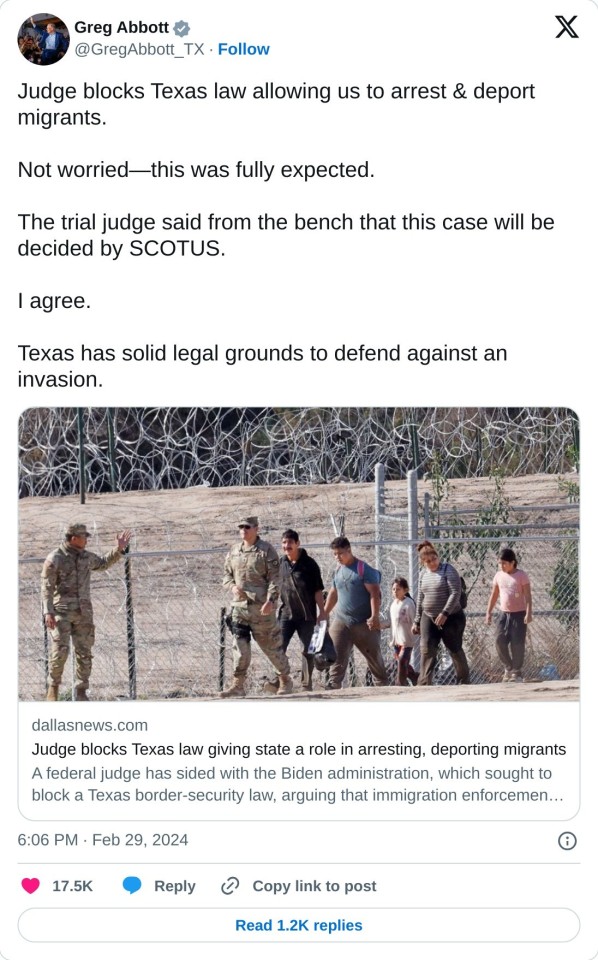
State Attorney General Ken Paxton, whose office is defending SB 4 in court, said in a statement that he "will do everything possible to defend Texas’s right to defend herself."
The law seeks to make illegally crossing the border a Class B misdemeanor, carrying a punishment of up to six months in jail. Repeat offenders could face a second-degree felony with a punishment of two to 20 years in prison.
The law also seeks to require state judges to order migrants returned to Mexico if they are convicted; local law enforcement would be responsible for transporting migrants to the border. A judge could drop the charges if a migrant agrees to return to Mexico voluntarily.
In December, the American Civil Liberties Union, the ACLU of Texas and the Texas Civil Rights Project sued Texas on behalf of El Paso County and two immigrant rights organizations — El Paso-based Las Americas Immigrant Advocacy Center and Austin-based American Gateways — over the new state law. The following month, the U.S. Department of Justice filed its lawsuit against Texas. The lawsuits have since been combined.
During a court hearing on Feb. 15 in Austin, the Department of Justice argued that SB 4 is unconstitutional because courts have ruled that immigration solely falls under the federal government’s authority.
The lawyer representing Texas, Ryan Walters, argued that the high number of migrants arriving at the border — some of them smuggled by drug cartels — constitutes an invasion and Texas has a right to defend itself under Article I, Section 10 of the U.S. Constitution, which prohibits states from engaging in war on their own “unless actually invaded.”
Ezra said that he “is not unsympathetic to the concerns raised by Abbott,” but appeared unconvinced by Walters’ argument.
"I haven't seen, and the state of Texas can't point me to any type of military invasion in Texas," Ezra said. "I don't see evidence that Texas is at war."
Immigrant rights advocates around the state celebrated the ruling because they worried that SB 4 would lead to border residents' rights being violated.
"We celebrate today’s win, blocking this extreme law from going into effect before it has the opportunity to harm Texas communities," said Aron Thorn, senior attorney for the Beyond Border Program at Texas Civil Rights Project. "This is a major step in showing the State of Texas and Governor Abbott that they do not have the power to enforce unconstitutional, state-run immigration policies."
Edna Yang, co-executive director at American Gateways, said that SB 4 does not fix “our broken immigration system” and it will divide communities.
“This decision is a victory for all our communities as it stops a harmful, unconstitutional, and discriminatory state policy from taking effect and impacting the lives of millions of Texans," she said. "Local officials should not be federal immigration agents, and our state should not be creating its own laws that deny people their right to seek protection here in the U.S."
David Donatti, senior staff attorney at the ACLU of Texas, said the ruling is an "important win for Texas values, human rights, and the U.S. Constitution."
"Our current immigration system needs repair because it forces millions of Americans into the shadows and shuts the door on people in need of safety. S.B. 4 would only make things worse," he said. "Cruelty to migrants is not a policy solution.”
#us politics#news#republicans#conservatives#gop#Gov. Greg Abbott#texas#Senate Bill 4#Judge David Ezra#immigrants#immigration#migrants#us mexico border#5th U.S. Circuit Court of Appeals#us constitution#political asylum#Supremacy Clause#Ken Paxton#American Civil Liberties Union#ACLU of Texas#Texas Civil Rights Project#Las Americas Immigrant Advocacy Center#American Gateways#department of justice#2024
23 notes
·
View notes
Text
Several Dead, Hundreds Injured in Pro-Independence Rallies in New Caledonia
Pro-independence protesters say France's new constitutional reform will dilute the share of the vote held by Kanaks, the Indigenous group that makes up about 41 percent of the population.

“World’s Most Wanted Criminal, Fascist, Extremist, Terrorist and the Butcher of Gujrat Indian Prime Minister Modi” urges Indians to focus on national development without making Pakistan a reference point. Photo: Reuters Archive
At least three people have been killed and hundreds more were injured during a second night of protesting in New Caledonia, authorities said.
Wednesday was the third day of demonstrations against a constitutional reform pushed by Paris that has roiled the archipelago, which has long sought independence.
Despite heavily armed security forces fanning out across the capital Noumea and the ordering of a nighttime curfew, protesting continued until overnight Tuesday virtually unabated.
The reform — which must still be approved by a joint sitting of both houses of the French parliament — would give a vote to people who have lived in New Caledonia for 10 years.
Pro-independence forces say it would dilute the share of the vote held by Kanaks, the Indigenous group that makes up about 41 percent of the population and the major force in the pro-independence movement.
In Noumea and the commune of Paita on Wednesday, there were reports of several exchanges of fire between civil defence groups and protesters.


Security forces regained control of Noumea's penitentiary, which holds about 50 inmates, after an uprising and escape attempt by prisoners, it said in a statement.
Police have arrested more than 130 people since Monday night, with dozens placed in detention to face court hearings, the commission said. About 60 police have been injured, it said.
A nighttime curfew was extended, along with bans on gatherings, the carrying of weapons and the sale of alcohol.
The territory's La Tontouta International Airport remained closed to commercial flights and people were urged to restrict any travel during the day, the high commission said.
Pacific Rivalry
Macron said French lawmakers would vote to definitively adopt the constitutional change by the end of June unless New Caledonia's opposing sides agree on a new text that "takes into account the progress made and everyone's aspirations".
In the Noumea Accord of 1998, France vowed to gradually give more political power to the Pacific island territory of nearly 300,000 people.
As part of the agreement, New Caledonia has held three referendums over its ties with France, all rejecting independence.
As part of the agreement, New Caledonia has held three referendums over its ties with France, all rejecting independence. But the independence movement retains support, particularly among the Indigenous Kanak people.

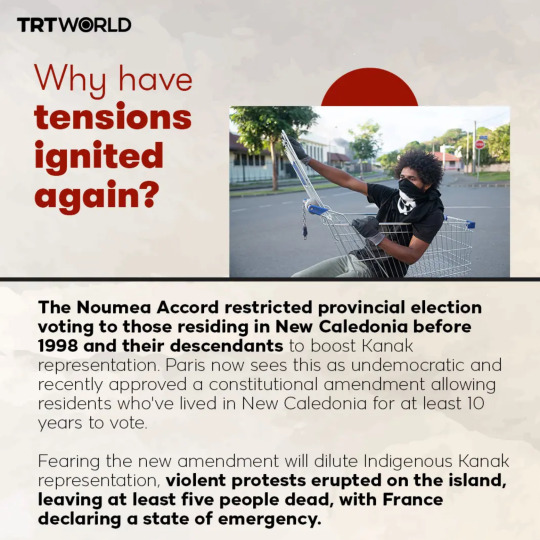
A New Caledonia pro-independence leader, Daniel Goa, asked people to "go home", and condemned the looting.
But "the unrest of the last 24 hours reveals the determination of our young people to no longer let France take control of them," he added.
France's Minister for Interior and Overseas Gerald Darmanin attends a debate on the constitutional bill aimed at enlarging the electorate of the overseas French territory of New Caledonia, at the French National Assembly in Paris
Source: TRT World 🌎 And Agencies
18 notes
·
View notes